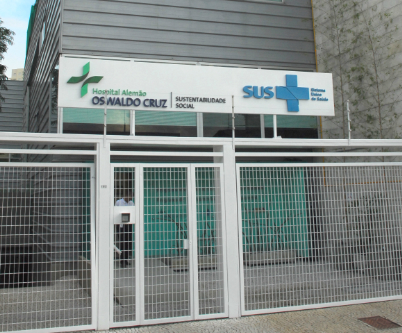About Hospital
History

With over a century of existence, the Oswaldo Cruz German Hospital was founded in 1897 and holds a position as one of the most recognized healthcare institutions in Brazil.
A group of German-speaking immigrants, whose dream had been to offer health services to both members of German colony and to the general public as a way to reciprocate the welcome they had received in the country, managed to enable the construction of the building, which, today, characterizes part of the Hospital complex in the district of Paraíso, in São Paulo.
Organizational Principles
Mission
We are an Institution committed to the population’s health needs, designed to provide full, individualized and qualified services, guided by scientific development through education and research.
Vision
To be a health institution recognized by society for its excellence in serving patients, in a comprehensive and individualized manner, with emphasis on the areas of digestive, circulatory, musculoskeletal diseases, oncology and care of the elderly.
Values
Ethics, Care, Appreciation of the Employee, Commitment, Scientific and Technical Development, Social and Environmental Responsibility.
Indicators
Large investments were made in 2012 in order to expand the hospital’s infrastructure. The main example of this was the completion of Block E, on which was invested more than US$ 120 million (almost 80% of the total investments made by the Institution throughout the year). In addition to this, other highlights for the Hospital were the inauguration of the Cardiovascular Intervention Center (Hemodynamic) and the adaptation works at the Diagnostic Imaging Center, carried out in order to get new units of equipment installed.
- Total hospital admissions: 16,764
- Surgical: 12,079
- Clinical: 4,685
- Average length of stay: 4.69 days
- Surgical procedures: 21,145
- Consultations at the First-Aid Clinic: 56,857
- Examinations performed at the Diagnostic Imaging Center: 142,832
- Total area of over 96 thousand square meters
- 278 inpatient beds, 29 beds for semi-intensive care and 44 ICU beds
- 18 Day Clinic beds and 3 rooms for minor surgery (Day Clinic)
- 19 operating rooms
- 1,914 employees
- 5,231 registered physicians
96,7% of patients satisfied *.
*Patient Satisfaction Survey from 2012.
Social Sustainability

In November 2008, the Oswaldo Cruz German Hospital established a partnership with Brazil’s Ministry of Health, signing an official undertaking to provide institutional support for the Unified Health System (SUS), and became a Social Assistance Beneficent Entity. Following this, the Hospital started to manage projects related to management, research, training and technology for the benefit of the population. Patients from SUS are attended with no charges in a special Unity of the Hospital.
Knowledge Generation – Institute of Education and Science (IEC)
In addition to its commitment to excellence in healthcare, the Hospital has the important mission of promoting the production of technical and scientific knowledge, disseminating knowledge of the institution and participating in the development of new drugs and therapies. Thus, the Hospital continuously strengthens the work of the Institute of Education and Science – focusing on the dissemination of knowledge, continuous education and training of the internal and wider public.
International Recognition
The process of bringing services into line with international standards of quality and patient safety represents a major improvement in key services provided by the Institution.
Being re-certified by JCI – Joint Commission International in 2012, which is one of the most important methodologies for evaluating health systems, for the Hospital, represents the ratification of its excellence in providing health services and places it among the best in the world.
In addition to this certification, it is worth noting:
- Telemedicine for the Mobile Society (Temos) Certificate: recognizes the Institution as having the highest level of excellence in providing care to European citizens traveling to Brazil.
- Certificate of Excellence in Bariatric and Metabolic Surgery from the Surgical Review Corporation: graded the Center for Bariatric and Metabolic Surgery of the Oswaldo Cruz German Hospital as having excellent facilities, equipment and multidisciplinary staff for comprehensive care of patients.



